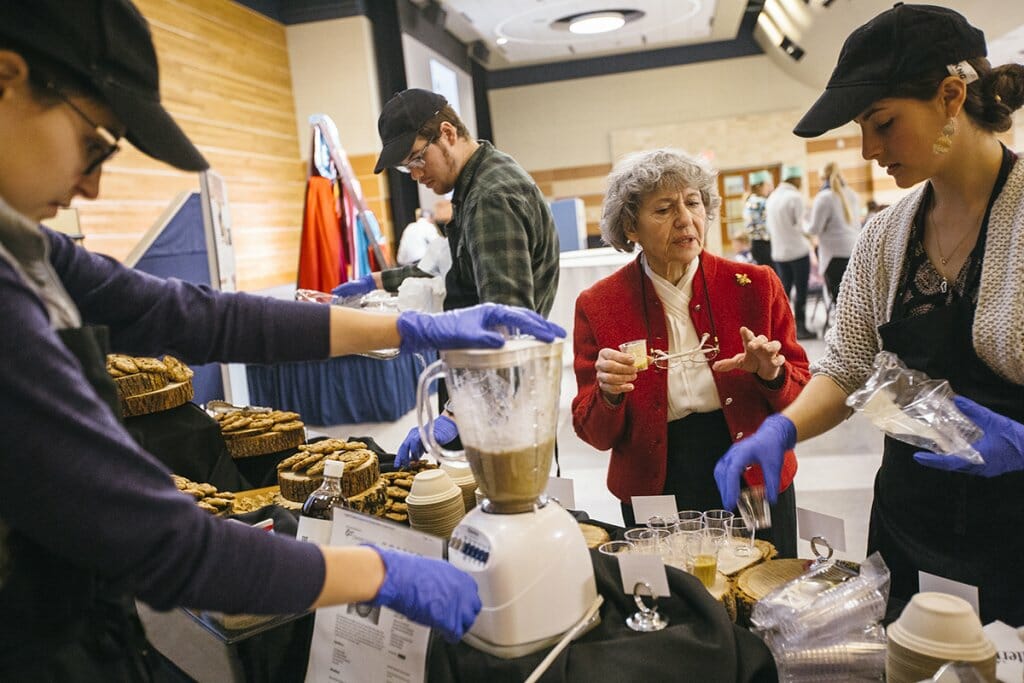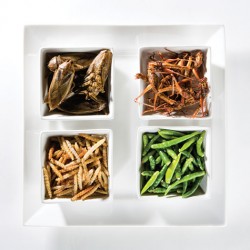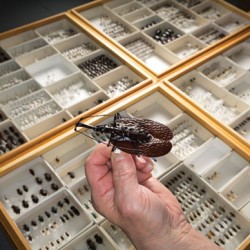Pass the Termite Chips
Florence Dunkel ’64, MS’66 sees food potential in bugs.

“One of my students invented a a shortbread recipe that called for lavender and black ants,” Dunkel says, “and it was out of this world.” Montana State University/Adrian Sanchez-Gonzalez
The petite Florence Dunkel ’64, MS’66, PhD’69 has a fitting nickname — Ladybug. This associate professor in plant sciences and plant pathology at Montana State studies insects. To be more precise, Dunkel, 79, has spent more than 50 years studying ways to get Americans to eat bugs.
Ten years ago, the United Nations Food and Agriculture Organization invited Dunkel (shown above with students at a bug buffet) to consult on edible insects. Later, she served on a global team that organized the first world congress on Insects to Feed the World. Two billion people routinely eat insects, says Dunkel, the former editor of the Food Insects Newsletter, “and they’re not at the poverty level. It’s an upscale thing in Mexico, Thailand, Korea, and Kenya.”
There’s a growing buzz about the insect protein market. The UN calls insects an “underutilized resource” especially in light of the need to combat climate change. By 2030, treats such as hazelnut cricket bread, mealworm wild rice, cheddar-flavored roasted scorpions, and termite chips could be part of an $8 billion market, according to Barclays Bank.
“My all-time favorite is grasshopper,” says Dunkel, who harvests them in her backyard garden, roasts them, and sprinkles them on salads. “I do take off the legs, because their spurs can irritate the throat.”
She says that black ants, which she freezes and dries, make a sublime culinary accent, since the formic acid in their venom imparts a lemony zing. “One of my students invented a shortbread recipe that called for lavender and black ants, and it was out of this world,” says Dunkel, who for the past 34 years has hosted an annual Bug Buffet in Bozeman that draws scholars and executives from food-insect companies.
When she began collecting data in 1991 from buffet attendees, only 20 to 30 percent found such cuisine acceptable. Today those numbers are closer to 70 or 80 percent. Dunkel attributes this to increasing interest in nutrition and environmental issues, as it takes less water, land, and food to raise bugs compared to larger animals.
Dunkel declines to predict when — or if — Americans will add bugs to their diets. “I think the disgust factor is still a big elephant in the room,” she admits. But younger generations might break the taboo. Her six grandchildren share her tastes. “As long as insects have chocolate on them, they’re fine with them,” she says.
Published in the Summer 2022 issue



Comments
Florence Vaccarello Dunkel January 7, 2024
Its now more than a chocolate treat. The medical community is perusing the double blind studies that confirm insects are effective prebiotics and to recognize insects as the most nutritionally dense food, plant or animal. Meanwhile food insects are making environmental sense as well. Thank you University of Wisconsin for being the first (1970’s) university in US to promote this important future, now current, food. Bug Appetit! Best wishes for a great year filled with delicious insects. Florence Vaccarello Dunkel